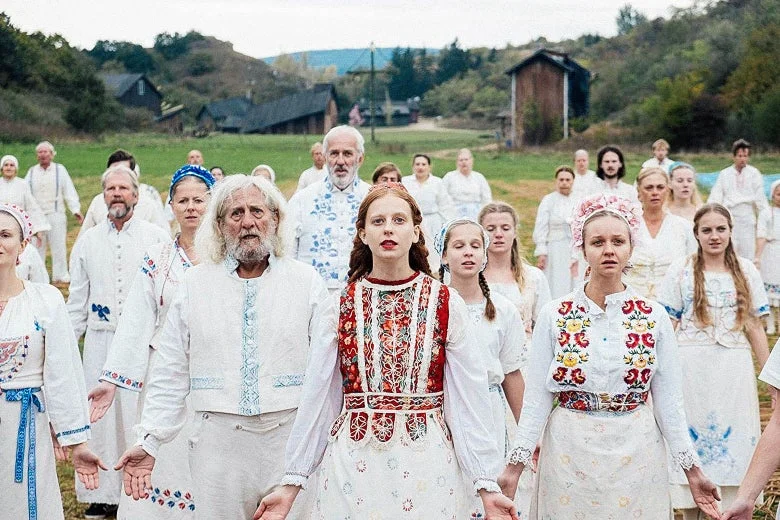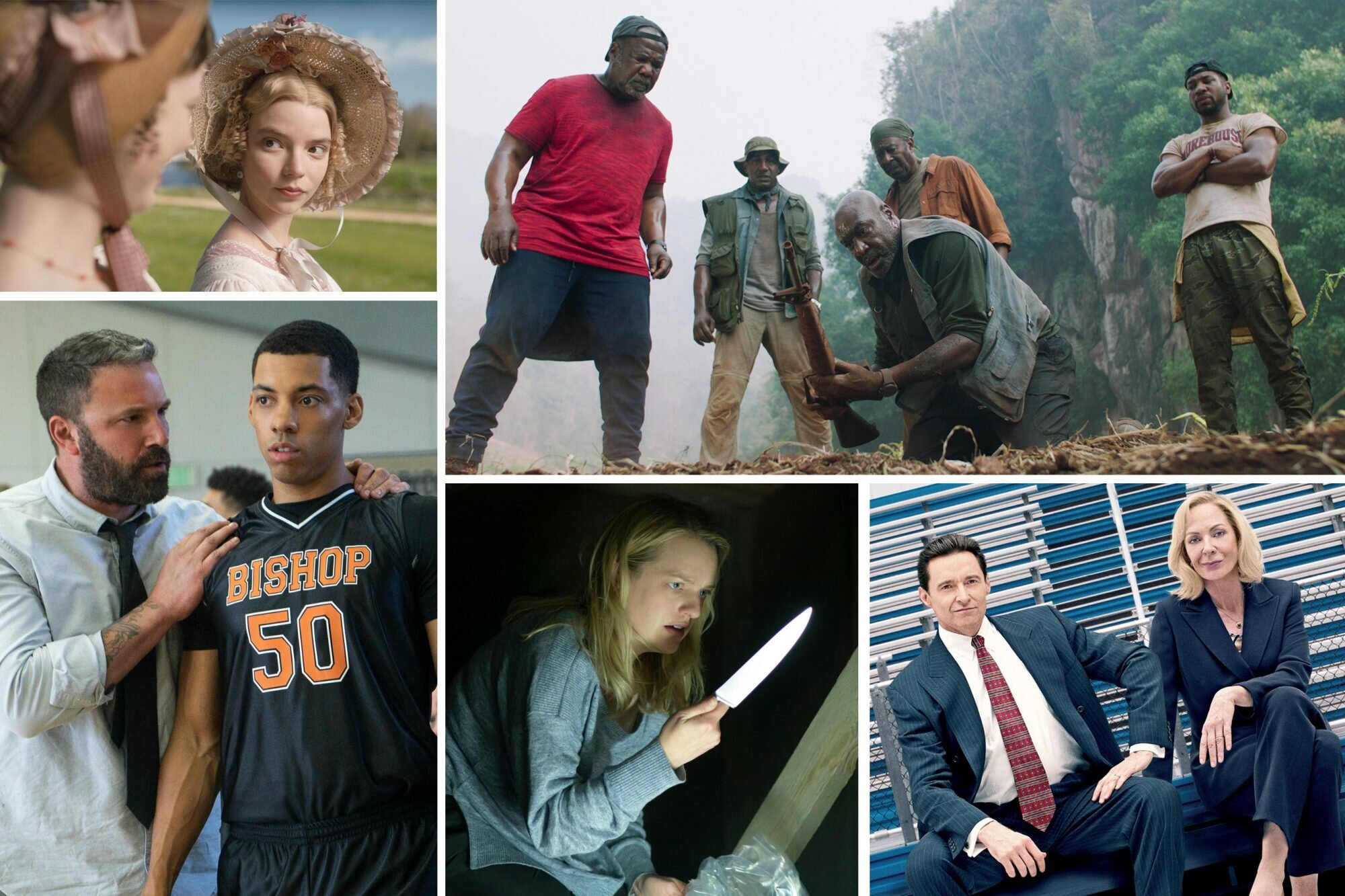Film Review: "Midsommar" ***
Midsommar ***
Ari Aster is a talented director; let’s not kid ourselves. He can craft together hair raising sequences with such precision that even though you know what’s coming, you can’t help but feel swept up in the images. There are a number of such sequences in his new film Midsommar which follows his previous occult horror film Hereditary. One such sequence in Midsommar happens in the beginning of the film to the protagonist, Dani (Florence Pugh); an event of such magnitude and tragedy that the film never quite lives up to these emotions. There is a shot of Dani on the phone with her boyfriend, Christian (Jack Reynor), that simply rests on her face. Many films would cut away, but Ari keeps his camera on Dani’s face, allowing Florence Pugh to deliver her best acting moment in the film. The wave of emotions as she tries to hide that she is crying and that she desperately needs Christian right now flows through the curt dialogue about anything else, except what is actually going on. I wish there were more of these instances in the film.
Using a stunning set of images, including the shot entering a small Swedish commune where the world literally turns upside down, the film methodically plots it’s way towards its obvious conclusion. The pacing is one of the films stronger notes; like The Shining, the film takes its time, slowly revealing itself to us and the main characters. As I said before, even when you know where you are going (all you need to do is look at the artwork that exists on all of the walls in the film, including in Dani’s apartment back in the U.S.), it still holds the audience in the palm of its hands and that is impressive. As I said, Ari Aster has talent as a director.
Midsoomar centers on several major questions involving relationships. The first of which is the relationship between Dani and Christian. What happens when you’re involved with someone who experiences such tragedy? If you were already unhappy, can you leave? Would that be fair to the person whose life is now upside down (see how I’m linking that image in here)? The trip to Sweden seems to be a new start for them, but as the trip unfolds, problems in their relationship rise to the surface. Another relationship “explored” is Dani to her sister. Certainly the climactic decision seems to place them in a similar place, although I am unsure exactly as to what the movie wants us to do with that comparison. I’ve placed “explored” in quotation marks because I am left unsatisfied by the lack of development of this profound connection.
The visuals and utter creepiness of the commune is the strength of the film, combined with shocking moments of violence, punctuated by ridiculous humor. Another of those great sequences happens on the first full day of the ritual to welcome the summer solstice. You know what is going to happen, but there is still an intensity to how the moment builds. All that being said, Ari Aster is also a director who needs to work on the psychology and believability of his characters. Dani has suffered such a trauma and it only exists on the periphery of the story. Because those opening images are so disturbing, they fail as a macguffin; they are not simply a vehicle to start the telling of this story. They are so essential to the character, and yet, never really confronted.
Another problem is with Christian and his motivations. Towards the beginning of the film, Ari quickly establishes an academic rivalry between Josh (William Jackson Harper) and Christian. I say establish instead of develop, because almost nothing is done with it. All we know is that Josh is writing his “thesis”... what exactly that thesis is never gets explored. They talk about academics as if they had never really taken a class. Then, in a moment where any intelligent person would want to try to leave the commune as quickly as possible, Christian decides that his thesis will also be on this community; vague… unsure… they treat the idea of a thesis more like a journalist reporting on something rather than exploring a deeper anthropological issue. Christian, apparently, given the chance to write something original discovers that it means more to him than risking his and Dani’s life. Without the importance of this thesis to Christian’s life goals, his dreams, his hopes being established, the idea that this would keep them in the commune is ridiculous. There isn’t enough set up stakes for us to believe that Christian would make this decision. As the problems continue to pile up in the community, really symbolized by the communal table the entire village eats at, where the outsiders sitting at it continue to reduce in number with weird stories as explanations, the main characters seem nonchalant about the situation they find themselves in.
From a narrative standpoint, I think Hereditary works on another level compared to Midsommar. The stylistic flourishes in Hereditary such as the mini doll houses that the mother creates work so well thematically. In Midsommar, I found myself questioning why mirrors were used? Or why the climatic decision happens considering that the choice is not set up prior to the scene where it is offered. The decision is certainly set up, but to give the May Queen the choice in the first place, seems to be… almost dropped in at the end; a thematic dias ex machina, if you will, to provide the point that this movie is actually about relationships. The issues I had with Hereditary, I also have here. Certainly the psychological beliebality of the characters is one. The second is the length of the film. Both Hereditary and Midsommar suffer from a really long third act. The pacing in Midsommar is deliberately slow and works really well; however, once the May Queen is crowned, the film drones on for another thirty minutes almost with the audience already knowing where this is going. The same thing happened in Hereditary after the father finally meets his fate
Midsommar is ultimately an exercise in style that is done really well. That is it so predictable is not the issue. It wears its influences on its sleeve, whether Shriely Jackson’s short story “The Lottery” or Ingmar Bergman’s darker psychological dramas. But, he lacks the human connection that comes from presenting realistic characters who make choices we believe their character would make. As a result, we feel distant to the material at times when we shouldn’t. There are moments where we should be right in the midst of the terror these young people are experiencing like the close up of Dani on the phone at the beginning, but too often, because his characters are not believable, the film remains at arm’s length.
Ari Aster is daring and bold, and hopefully will continue to grow as a director of such talent.






